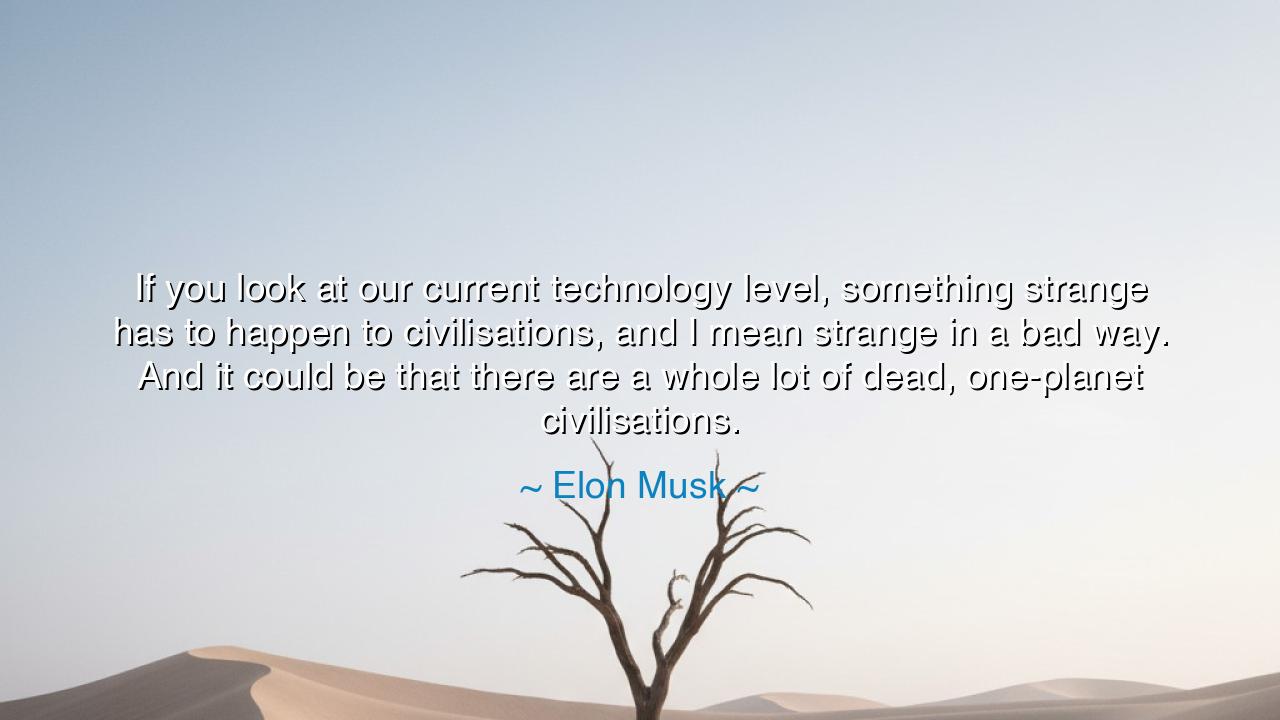
If you look at our current technology level, something strange
If you look at our current technology level, something strange has to happen to civilisations, and I mean strange in a bad way. And it could be that there are a whole lot of dead, one-planet civilisations.






Elon Musk, a herald of the stars, once declared: “If you look at our current technology level, something strange has to happen to civilisations, and I mean strange in a bad way. And it could be that there are a whole lot of dead, one-planet civilisations.” These words are both warning and prophecy. For they speak of the fragile thread upon which every world’s destiny hangs—the peril of remaining bound to a single cradle, unable to rise beyond it. Musk reminds us that greatness achieved only on one world may still end in silence, for fire, folly, or fate can sweep away all that has been built.
The ancients, too, felt this truth in smaller forms. Whole civilisations once flourished—Sumer, Egypt, Rome—yet many of them fell, undone not only by enemies, but by their own limits. The Maya raised cities from the jungle, yet drought and division brought their downfall. The Romans mastered roads, law, and empire, yet they too collapsed beneath the weight of corruption and invasion. These were not “one-planet” peoples, but their fate mirrors Musk’s warning: power without foresight leads to ruin. What he sees on the scale of worlds was already written in the histories of nations.
At the heart of Musk’s saying is the Fermi paradox—the haunting question: if the universe is so vast, where are all the others? Why do we not hear their voices? Why does the night sky remain silent? His answer is grim: perhaps many worlds once gave rise to life and intelligence, but those peoples, bound to their single planets, destroyed themselves before they could cross the gulf of stars. Perhaps the cosmos is littered with the ghosts of civilisations, each silenced by war, pride, or the misuse of technology.
History gives us foreshadowings of this fate. When humanity discovered nuclear weapons, it gained both the means to defend itself and the power to erase itself in an instant. For decades, the world lived under the shadow of annihilation, where a single miscalculation could have ended all. That humanity survived the Cold War was not a guarantee but a miracle of restraint. Musk’s words remind us that every leap in technology carries with it a shadow: the chance that what is built for progress may also be used for destruction.
Yet Musk’s warning is not despair but challenge. He calls us to rise beyond being a “one-planet civilisation,” to plant roots among the stars, so that the fate of Earth does not also mean the fate of humanity. His vision is not simply about rockets or Mars; it is about survival, about resilience, about ensuring that the story of mankind does not end in a single chapter. To remain bound is to remain vulnerable. To expand is to endure.
The deeper teaching here is universal: all progress must be paired with responsibility. Technology without wisdom is a torch in the hands of children—capable of light, yet also of fire. If civilisations fall, it is not because they lacked invention, but because they lacked restraint, foresight, and unity. Thus, the danger Musk points to lies not in the stars, but in ourselves. We are both the builders and the destroyers, and our choices determine which we shall become.
So, dear listener, take this wisdom to heart: do not marvel only at our technology, but ask how we wield it. Do not assume survival is automatic, but work to secure it with patience, humility, and vision. In your own life, as in the fate of nations, do not squander what is fragile by chasing pride or short-term gain. For Musk’s words are not merely about distant galaxies—they are about us, here and now. Civilisations die when they do not guard themselves from within. Civilisations endure when they dare to dream beyond the limits of their cradle. Let us, then, choose endurance. Let us choose the stars.






AAdministratorAdministrator
Welcome, honored guests. Please leave a comment, we will respond soon